One of the many facets of Hongdae is its innovative publishing culture. The area is home to both large and independent publishers, design houses, and book cafés. The synergy of the community and publishing scene allows even smaller, independent bookstores to thrive.
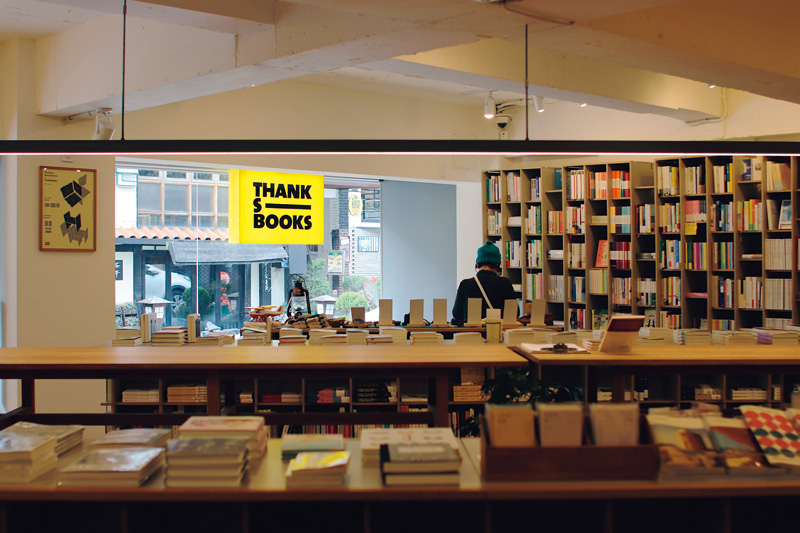
THANKSBOOKS is a pioneering neighborhood bookstore. Most customers are people in their 20s and 30s who work in the arts and culture industry. The owner is a former designer whose tastes are reflected in the store’s sophisticated selection of books.
© THANKSBOOKS
First flourishing on the back of its vibrant art and music scene, Hongdae underwent yet another change at the end of the 1990s, when professionals from fields such as advertising, animation, broadcasting, cinema, design, fashion, photography, and publishing flocked to the neighborhood, giving it a new identity as a creative hub.
A TALE OF TWO HUBS
Paju Book City, Korea’s elaborate book publishing hub in Gyeonggi Province, was conceived by a group of small and mid-sized publishers who formed cooperatives and received government assistance to revitalize their industry. This cultural complex opened in 2003 and is now home to around 900 book-related businesses. While the Paju complex was still in the planning stage, a smaller, lesser-known publishing hub grew organically in the Hongdae area.
Together, Paju Book City and Hongdae provide jobs for the largest number of publishing professionals in the country. Moonji Publishing Company and Changbi Publishers, once called the two giants of the Korean publishing industry, both have their offices in Hongdae. Moonji was established in 1975 by four literary critics who had edited the quarterly magazine Munhakgwa jiseong (Literature and Intelligence) since 1970. Initially headquartered in Seoul’s Jongno District, the company relocated in 1989 to Seogyo-dong, the original neighborhood that became known as Hongdae. Changbi had a similar origin story, publishing a quarterly literary journal, titled Changjakgwa bipyeong (Creation and Criticism), from 1966 and its first book in 1974. The company is headquartered in Paju, but its Changbi Seokyo Building, where it carries out a wide range of projects, is in Hongdae. Aside from these two, many leading domestic publishing houses have chosen the area for their headquarters.
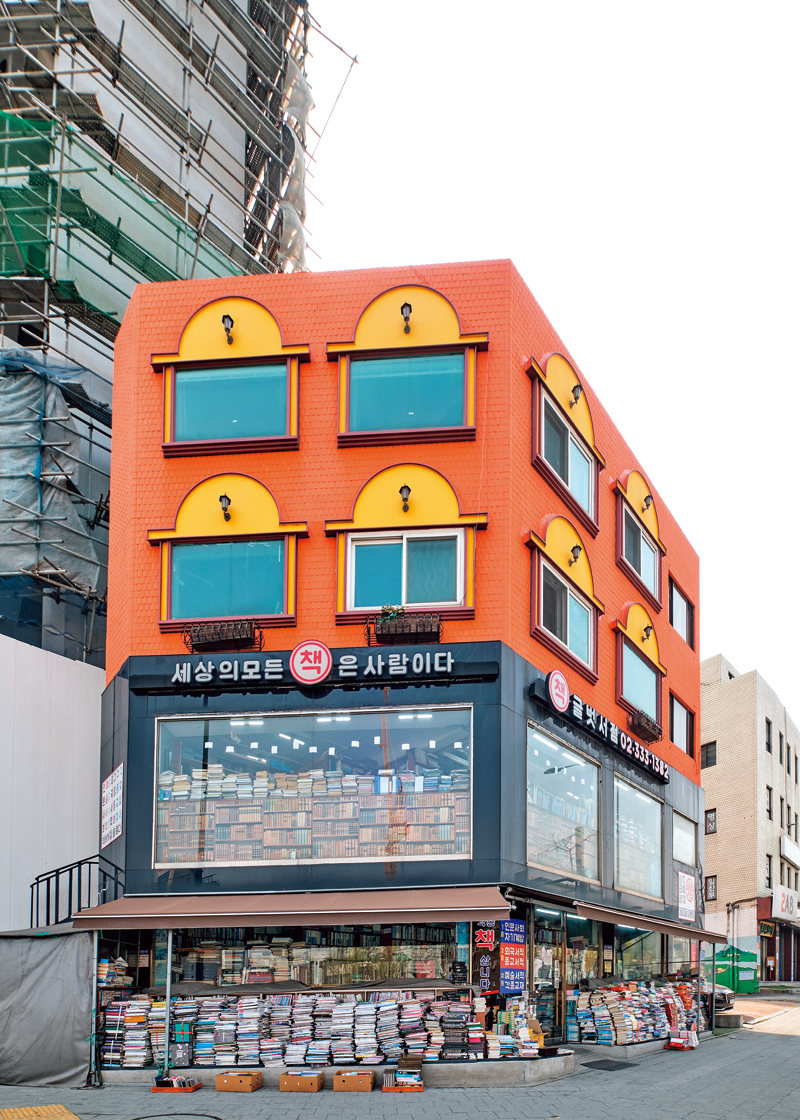
Geulbeot Books opened in 1979, which makes it one of the old-timers in the Hongdae area. It sold mostly art books in the beginning but now carries a wider selection.
© Mapo District Office
Another feature of the Hongdae publishing scene is the relationship of mutual influence bet ween publishers and the community. For instance, the Seoul Wow Book Festival, the first of its kind held in the Hongdae area, is a platform that helps foster an expansive reading culture and energizes the publishing industry as well as the arts and culture sector. Founded in 2005, this annual autumn festival is one of the most highly anticipated events for readers and the local community. Book lovers eagerly take the opportunity to interact with publishing industry figures, writers, and artists, who participate in the festival’s program and share their experiences.
Wow Culture Lab, host of the festival, initiates activities in connection with numerous publishers and related groups in Hongdae. Its efforts to widen the scope of the event has led to an international publishing forum, research on ways to revitalize local libraries, and arts and culture education for office workers.
PUBLISHERS’ BOOK CAFÉS
Hongdae is full of book cafés that are owned by publishers and operated in ways quite different from conventional cafés. They are not mere promotional venues but cultural spaces whose activities and events enliven the Hongdae scene.
Munhakdongne Publishing Group’s CAFE COMMA is a case in point . The prestigious publisher opened its first COMMA store in 2011 in an alley near the former Hongdae parking lot near Sangsu Station. The second café was opened near Hongik University Station, catering to the crowds constantly entering the neighborhood. The two cafés are now no longer there, but the publisher has opened new branches in the adjacent Hapjeong-dong and Donggyo-dong as well as other parts of Seoul and the greater metropolitan area.
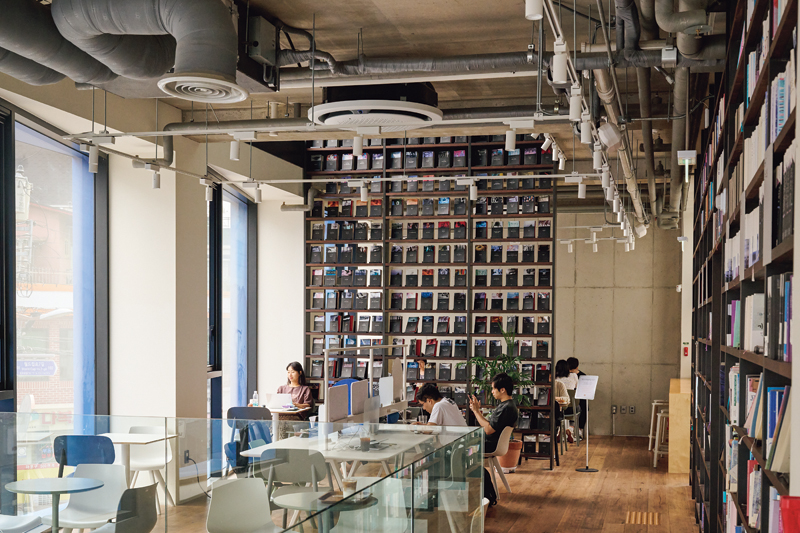
When the café culture took firm root in Korea during the 2010s, book cafés emerged where visitors could browse through books over a cup of coffee. This trend is led by publishers who are not just interested in selling books but host events to promote a richer reading culture. The photo shows CAFE COMMA, run by the Munhakdongne Publishing Group.
Nobel literature laureates J.M.G. Le Clézio and Kenzaburō Ōe have met with readers at CAFE COMMA, and lectures by famous authors, including Hwang Sok-yong, Han Kang, and Yan Lianke, are regularly held there. The book cafés are also used to host corporate and cultural events and as settings for K-dramas.
Changbi has been running Café Changbi since 2012, working with partners in other fields. In 2021, it began collaborating with lifestyle brand Brown Hands, which roasts coffee beans on-site. The aroma of fresh coffee coupled with a display of furniture and lighting designs create a vibe that attracts young customers.
Last June, Moonji joined the book café scene by opening Moonji Salon in the basement floor of its Seogyo-dong building. It features a space serving coffee and whiskey and an event hall for book talks and lectures. On the first floor is a showroom, Moonji Post, with an interior designed to resemble a post office, where readers can leave letters or messages for authors.
INDEPENDENT BOOKSTORE BOOM
Along with the book cafés run by publishers, independent bookstores in the Hongdae area are also thriving. Many smaller ones, such as YOUR-MIND and THANKSBOOKS, display or sell publications not found in large franchise stores.
YOUR-MIND is known as Korea’s first bookstore specializing in independent publications. Since 2009, it has sold books by small publishers and art books personally created by writers. Also positioning itself as a publisher, it hosts the annual Seoul Art Book fair called Unlimited Edition. In the beginning, the book fair was held at a small gallery in Hongdae, but it has since grown and recently moved to venues like the Seoul Museum of Art and Ilmin Museum of Art. In 2017, YOUR-MIND relocated from Seogyo-dong to Yeonhui-dong and has become the neighborhood’s latest attraction, drawing quite a crowd on weekends.
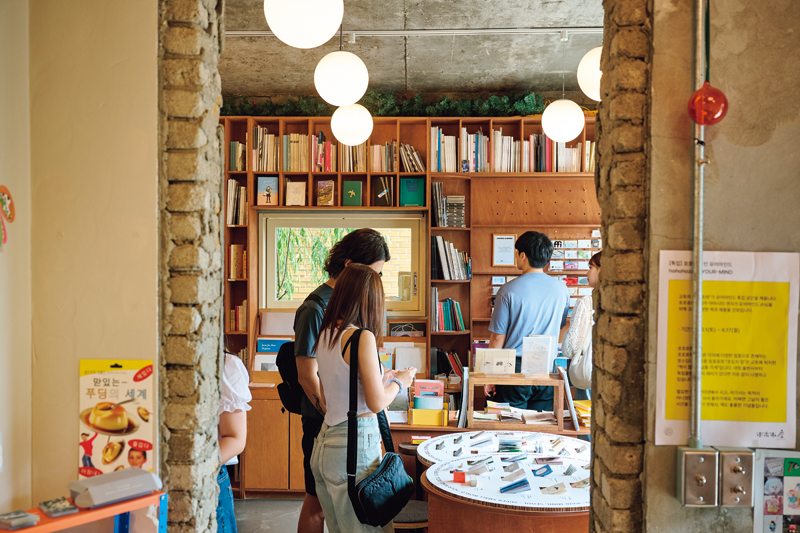
The bookstore YOUR-MIND relocated from Hongdae to nearby Yeonhui-dong and expanded its business model by adding stationery goods made in collaboration with artists.
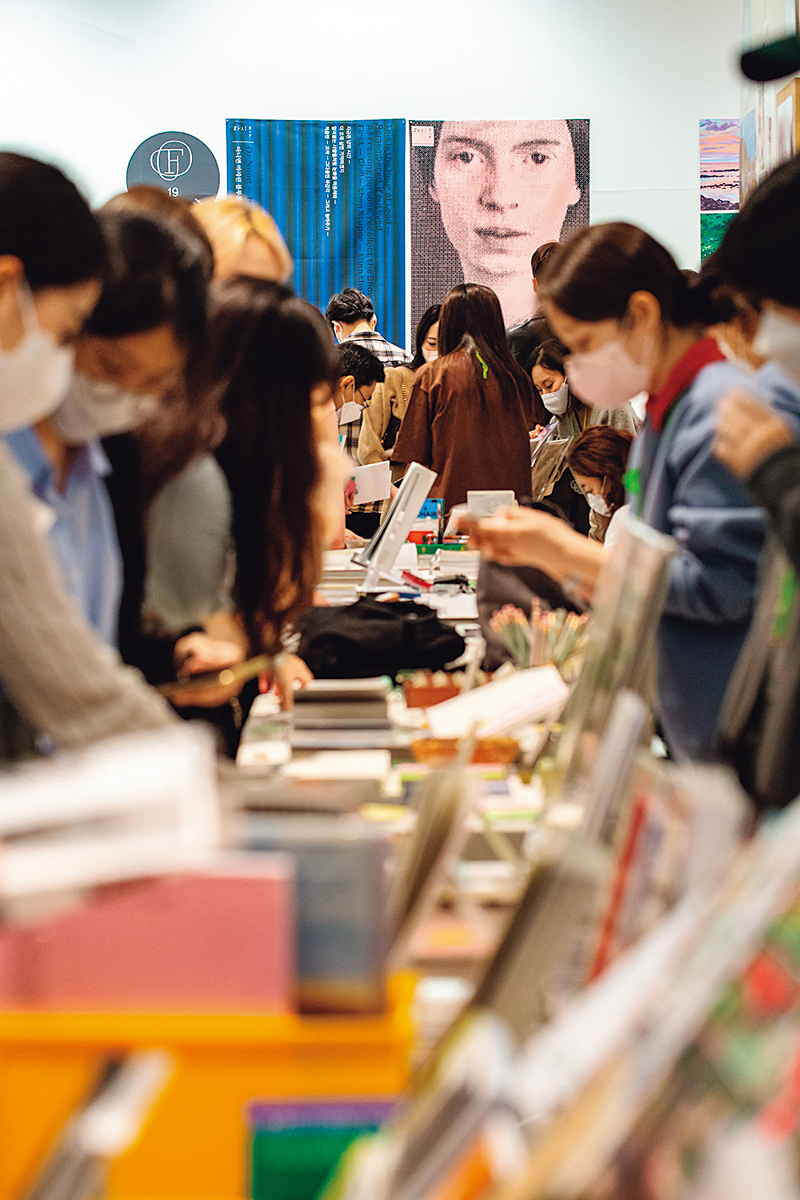
Unlimited Edition is a large fair that gathers producers of independent publications and art books. It is hosted by YOUR-MIND, Hongdae’s first independent bookstore. The event is also open to participants from outside Korea, allowing visitors to gauge the latest international art book trends.
© Hyojin Lim, Unlimited Edition
THANKSBOOKS, which opened in 2011, is a curated bookstore, selling select works that deserve special attention. It operates a studio for book-related design work and co-hosts a very popular monthly exhibition with local publishers. The store may not carry the widest selection of books but it serves as a popular local gathering place.
While YOUR-MIND’s focus is on distributing independent publications, THANKSBOOKS deals with a greater spectrum of books. However, the two are similar in that they host independent book fairs and documentary screenings to provide forums for the public, and choose not to operate their spaces in an overly commercial fashion. Some other distinctive indie book stores in Hongdae and its adjacent neighborhoods include gaga77page, Bookshop Lisbon, AndoBooks, and Chaegbangyeonhui.
Whether you prefer the book cafés run by big publishing houses or the abundance of indie bookstores, the greater Hongdae area is a must-visit for book aficionados, offering popular and rare books, cultural events, and the chance to meet famous authors, even a Nobel literature laureate if you’re lucky.